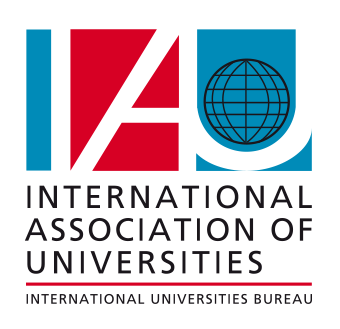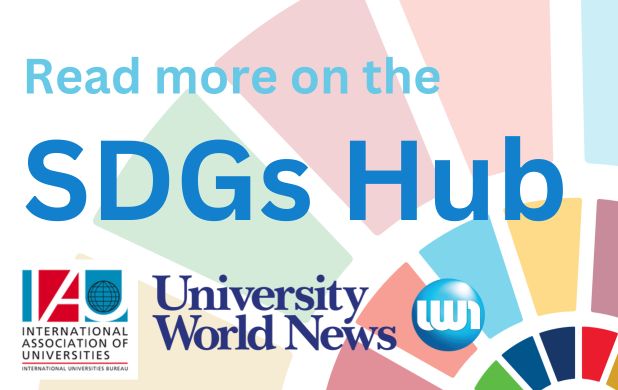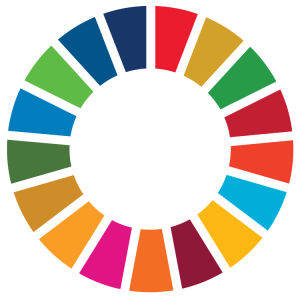Universities calling for more innovation, transformation and collaboration for SDG 12 and Agenda 2030: A discussion with the IAU HESD Cluster (July 2021)
During the UN High-Level Political Forum 2021, the International Association of Universities (IAU) organized a virtual event with the SDG 12 Cluster network on: “Transformative Innovation and Collaboration for SDG 12: Responsible Consumption and Production at Universities” (13 July 2021).
After taking part in the HLPF in 2019 in New York and in 2020 virtually, IAU was also very involved for the 2021 edition. Its Members and partners participated in virtual sessions co-organised by IAU and partners, including this webinar as part of the IAU Webinar Series on the Future of Higher Education. This particular webinar with its focus on SDG 12: Responsible Consumption and Production, as well as the link to the high-level events taking place that week, attracted around 100 participants joining live from around the globe, most (but not all) affiliated with higher education institutions.
The summary below gives insights into the key points discussed and the whole webinar can be watched as a recording here.
Summary of the discussion
The webinar was opened by Dr. Hilligje van’t Land, Secretary General International Association of Universities (IAU). She welcomed the participants and introduced IAU. Isabel Toman, Programme Officer Sustainable Development at the IAU, presented the concept of the IAU Global Cluster on HESD and how the IAU’s engagement at the UN HLPF is crucial to stress the role of higher education, a key player for Agenda 2030. Dr. van’t Land then handed the session over to Dr. Zinaida Fadeeva, Professor at Nalanda University, India, who moderated the discussion with the IAU SDG12 Cluster members.
The experts on the panel during this SDG12 webinar included Roger Petry, Professor of Philosophy at Luther College (University of Regina, Canada) and Co-coordinator of RCE Saskatchewan, Rose Ramkat, Lecturer and Deputy Center leader in the Center of Excellence in Phytochemicals, Textile and Renewable Energy (Moi University, Kenya), Detlev Lindau-Bank, Assistant Professor and Researcher (Vechta University, Germany), Saidatulakmal Mohd, Associate Professor and Director at the Centre for Global Sustainability Studies (Universiti Sains Malaysia), and Ian Vázquez-Rowe, working at the Peruvian Life Cycle Assessment and Industrial Ecology Network (PELCAN), in the Department of Engineering (Pontificia Universidad Católica del Perú). The panelists presented innovative ways and strategies linked to SDG 12 and sustainability at large, and discussed why it is so important to address this topic now. Roger Petry pointed out how a previous HLPF considered SDG 12 to be 'at the heart' of the SDGs, as the consumption and production systems have major impacts on the social, economic and ecological goals of the other SDGs. He also stressed that universities are key for the transformation that society needs, as they have always played an important role during processes of major societal change. Rose Ramkat advocated a whole-institution approach, explaining how the overall SDG strategy of Moi University is being translated into action.
Detlev Lindau-Bank highlighted the importance of sharing information, with students, with colleges and outside the university, to create more awareness around sustainability. Moreover, he believes in creating a culture of sustainability, which means creating sustainable values and goals. Saidatulakmal Mohd gave insights into the recent focus on waste management at Universiti Sains Malaysia, for instance a project building a prototype to transform waste to carbon. This machine is an alternative to the common composting as the duration of turning waste into carbon powder as fertilizer or fuel source is shorter. The presentation was followed by Ian Vázquez-Rowe, who presented PUCU’s approach to green public procurement and the use of life-cycle methods at the university and with public authorities.
Overall, the discussion focused on the whole-institution approach, as the panelists agreed on the fact that sustainability has to become part of every aspect of the university ecosystem, involving all stakeholders across the entire institution. Furthermore, higher education informs and impacts the broader discussions. All experts stressed the need for action in everyday life and society. In addition, the examples given are proof that the higher education community has already taken meaningful actions towards sustainability. Nevertheless, quite a bit of work has yet to be done to achieve the goals set in Agenda 2030 (and beyond) to find a path for a more sustainable future for all. The experts from the discussion also made clear that the way to get there is certainly not as simple as it sounds, as an understanding of complexity, as well as experience and competence are needed for innovation. Partnerships are essential and thus we look forward to continuing the work of the IAU HESD through continued conversation, joint action and advocacy. Thank you to all the speakers, moderator, organizers and participants for this inspiring and fruitful discussion.



